
Granted Dignity and Humanity: Experience of Palliative Care in Gaza
![]() Hannah Ikong
Hannah Ikong
![]() 14th June 2023
14th June 2023
In the last year, Cairdeas IPCT has partnered with the Islamic University of Gaza (IUG) and the Turkish-Palestinian Friendship Hospital (TPFH) to create a palliative care professional diploma programme. Together, with the support of the University of Edinburgh and Palliative Care in Humanitarian Aid Situations and Emergencies (PallCHASE), the students have covered six modules of instruction with visiting faculty, as well as clinical instruction and fortnightly, virtual teaching sessions.
Our Medical Director, Dr Mhoira Leng, alongside Dr Khamis Elessi the Gaza lead, have been mentoring and supporting the TPFH to develop and implement a palliative care clinical programme.
The next international faculty visits will be in August 2023, and we wanted to hear from some of the students for their key observations, feedback, and experiences. We asked members of the TPFH palliative care team who are also students on the Diploma.
One student, Suha S. Shaa’th, a senior pharmacist who is also the lead for opiate procurement, shared several reflections on palliative care. She explained “the importance of letting patients live in dignity and die in peace,” while adding that “palliative care reinforces the sense of humanity and improve the concept of compassion and empathy, that means we do not deal with patients as numbers.” Suha highlighted her skills gained through the diploma programme, such as communication, working in multidisciplinary teams and evidence-based practice.
A physician specialising in pain and palliative care management at TPFH, Amjad F. Eleiwa, spoke about the knowledge gained from the programme, saying, “I started to deal with the patient not only as someone in pain, but also as a whole person.” Amjad then shared a patient story to illustrate holistic care:
"A few weeks back, I had a 26-year-old patient who was diagnosed to have Ewing sarcoma. The patient started his management in Jordan then was referred back to Gaza after expiring all lines of treatment … The issue we faced is the shortage of controlled release oral morphine in Gaza and that is where the palliative care training came in. We started to look for available alternatives and gave him sub cutaneous injections of morphine and patches of fentanyl. His pain started to get under control."
"During our work with the patient, we noticed that he accepted his condition but not his mother. She was so close to him and she had a lot of questions like "why him?". We had our focus on the patient and on his mother to prepare her for the inevitable: his death."
"At the end, she was thankful that he died in peace with no pain and with great acceptance."
We will close with the comments from Basel M. Ashour, a psychologist and student in the diploma programme. Basel noted that “psychological pain is considered one of the most aggressive pain among cancer patients” then discussed how “palliative care added to my experience how to know other team’s knowledge … about nutrition, pain management, physiotherapy, etc.”
He concluded: “Many people just need us to spend time with them, to communicate well, to be dealt with extra respect and be granted dignity and humanity.”
We will share more of the experiences of students and faculty in the future. We thank all the students in diploma programme for their implantation of compassionate palliative care; may we all continue to uphold dignity and humanity.
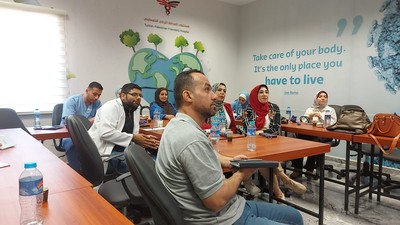
Students gather to watch the virtual presentation during a teaching session.
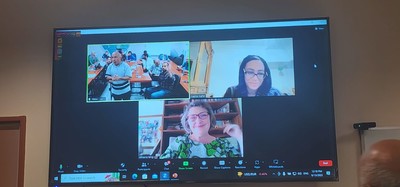
In this teaching session, Dr Khamis Elessi is in person, while Dr Mhoira Leng and Dr Nahla Gafer connect over Zoom.
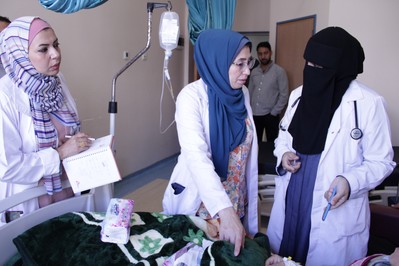
Suha S. Shaa’th, Mervat Abdelkarim Hammad and Nour M Almasry during a ward round as they discuss the patient.
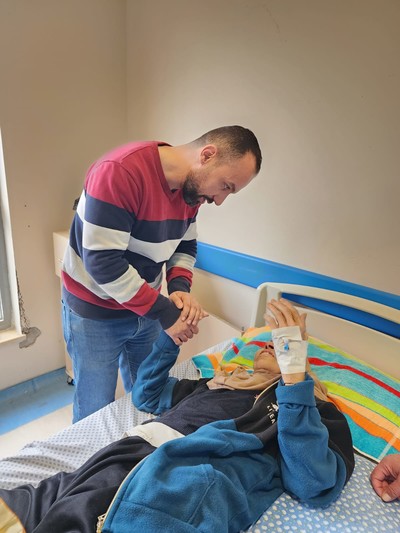
Psychologist Basel M Ashour with a patient on a ward round.
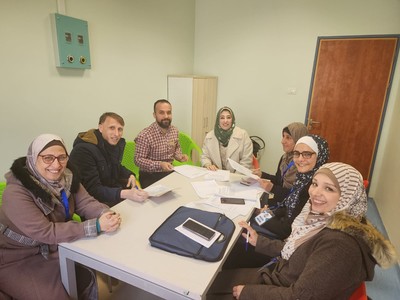
Multidisciplinary team work among students and their colleagues.
An interview with Godfrey Oziti, Cairdeas Scholar
![]() Hannah Ikong
Hannah Ikong
![]() 30th May 2023
30th May 2023
Godfrey Oziti may be a name you’ve heard of before in Cairdeas IPCT. Godfrey serves as a nurse with our partner Peace Hospice in Adjumani and Obongi districts (Northern Uganda), is involved in many training and research activities, and now is a Cairdeas Scholar as he continues his education in nursing.
You may have also met Godfrey in our March 2020 blog on palliative care services during COVID-19 in Northern Uganda. Rereading this blog and speaking to Godfrey more over this last month has brought me to a realisation: Godfrey has a huge heart for his patients.
In our last conversation, I asked him to define “palliative care.” I am always curious of how those have worked or specialised in a field for some time put “palliative care” in their own words. Godfrey didn’t tell me a textbook definition either; rather, he captured the heart of palliative medicine by telling me a story.
“Let me start with a scenario. Okay, once I paid a visit to a certain patient in the community and the patient had a fungating wound that was smelling really bad. The family was locking the patient inside a room because they said that he was smelling badly. At first the family first refused me to come in there. But I insisted and then I went inside with the patient. I asked them to bring soap and water, and then I bathed him and arranged the room. After that, I told them to bring them food and we started with tea, and we kept on eating. And he [the patient] was very happy to be staying in a clean environment and eating.”
Godfrey went on to explain the symptom management of the wound, how they could help with the patient’s pain, and what he did to work with the family to understand the patient’s condition and how to care for the patient well.
After talking about this particular patient, he begin to tell me that there is indeed a need for community sensitisation and education on palliative care needs. “We do love our families” he explained, “but sometimes with they are sick, we leave them alone. And so the psychological diseases take many of our patients. And there is really a need for us and with my studies, I know we should do more.”
His studies! I had to ask about the scholarship that he received and how school was going. He started his Diploma in nursing this year and will be going for the first end of semester exams soon. The programme is a year and a half, located in the Gulu School of Nursing and Midwifery.
Asking about his schooling quickly turned to plans of the future. “I know that from here, I can do any other course or diploma,” Godfrey explained after saying that it was his dream to go back to school. “Our medical nursing tutor is very encouraging and gives us career guidance so I am really learning so much from her. She elaborates on what to do and how to go to the next step in their career. She adds this advice to her lectures.”
He’s looking forward to the next semester already as one of the courses is an introduction to medical research, including its theories and principles. Godfrey was quick to tell me that he really has enjoyed his time in data collection in the several research projects involving Cairdeas IPCT and Peace Hospice.
He was also quick to explain why: “I love talking to the participants and getting their views, how they are really coping up with their challenges and how we are addressing them. That’s what I really enjoy, getting to know someone’s problem and then and then offering psychosocial support afterwards too.”
I wanted to dig a little deeper; to better understand Godfrey’s heart for patients and how he has learned this approach. When I asked about professional mentors in nursing or palliative, the name “Vicky Opia” appeared, the Peace Hospice Executive Director and Palliative Care Ministry of Health lead for Adjumani district. This is what he told me:
“Sister Vicky has mentored me mostly in palliative care because in my [nursing] certificate, there was only a small part of the course in palliative care. When I join Peace Hospice, the first thing I noticed was how she handled patients with chronic illnesses and the way she did her work; how she was giving care to the patients was inspiring. So I started to copy what she was doing and how she was relating with the patients. I thought to myself, I need to start working with chronic illnesses. I need to work like Sister Vicky. Even if I do not go back to school, I need to work like Sister Vicky. That is how I started to love my work so much.”
Godfrey then explained how at the beginning, he met a patient in critical condition who had given up on life. “The nursing care that was modelled for me by Sister Vicky was a kind of care that gives the patient’s life back and is enjoying life again. I like to transform the patient’s life, so they are not just counting down the days.”
As a Cairdeas Scholar and nurse at Peace Hospice, Godfrey is looking forward to doing more palliative care work in his future. He hopes to keep on studying (or learning) and is most concerned working with refugees and other vulnerable populations.
Godfrey is concerned that there is not enough of the right type of health care worker to provide for palliative care. “You know,” he told me in closing, “the people available with the knowledge of palliative care and with the time to talk to the patient and family members are not there. But if I can go through my studies and go through to be a specialist, then I can do more as Peace Hospice is concerned.”
His heart for the patient – compassionate, quality palliative care service provision at its best – as well as his concern for patients without such services is a call to action at Cairdeas. We must continue the capacity building, training, advocacy and research to support palliative care services with health care systems as well as for communities and individuals.
As an individual, Godfrey’s last comment was one of gratitude, thanking Cairdeas for the partnership and support of Peace Hospice. “I am so happy for Cairdeas for carrying out the different training for village health teams (VHTs) and health care workers and providing scholarships for people like me. I hope they continue to expand the scholarship programme.”
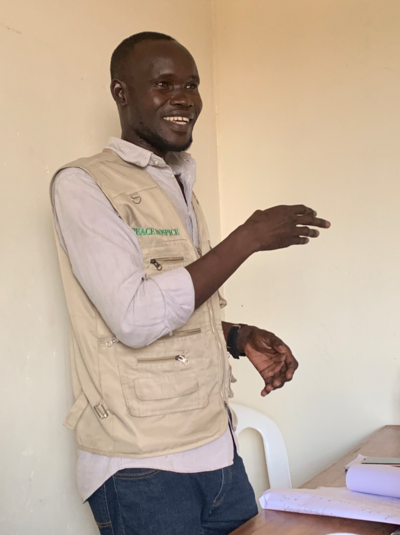
Godfrey Oziti in the Peace Hospice uniform, giving feedback during a recent training.
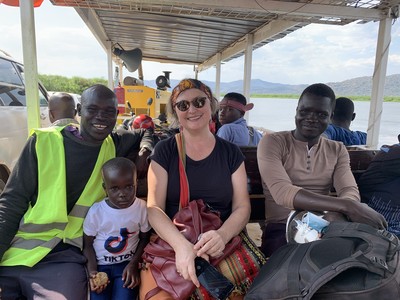
Godfrey Oziti (left) sits on the ferry crossing the Nile River next to Dr Mhoira Leng and Simon Maku.
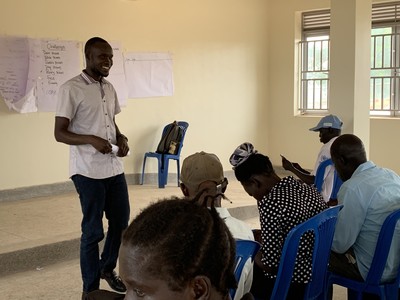
Godfrey Oziti leads a discussion on community generated research data with village health teams in Obongi district.
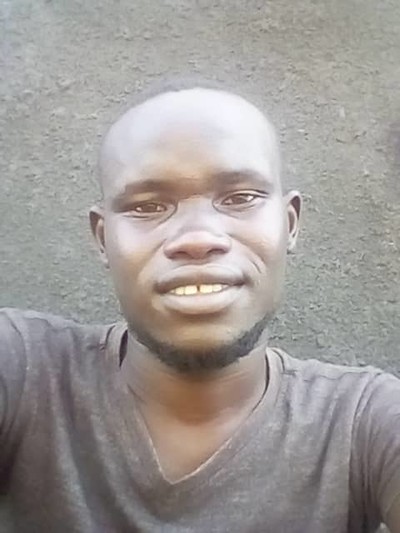
A snap from Godfrey himself.
Sudan: Watchful Waiting, by Dr Nahla Gafer
![]() Cairdeas
Cairdeas
![]() 3rd May 2023
3rd May 2023
This blog was written and submitted by Dr Nahla Gafer, a clinical oncologist at the Khartoum Oncology Hospital, Sudan.
Watchful Waiting.
It all started by hearing some fireworks on Saturday morning, 15th of April. Thank God the boys were at home, in addition to their friend and a lady who helps with the house-chores once a week. When the shooting did not seem to end, we opened the news (Alhadath TV channel), and there it was: a conflict between 2 armed forces in Sudan. We are hearing mixed information about who started the fight, but what was sure is that the fight is extensive at several cities, all parts of Khartoum and using all types of arms.
Through WhatsApp and Facebook we received the information to stay at home, that it was dangerous to leave house, as well as information showing which party is on the right and which party is winning (which is strangely each side!) and that everything will end in a day or two.
From that moment our lives changed 180 degrees. All daily plans were cancelled, even near-future plans became so absurd. A war was held on top of our heads and we have no say in it and not even the right to ask, or check how we are going to survive. WhatsApp messages were active throughout the day. We were checking about our close relatives and neighbors. Comforting ourselves that if they are okay, we shall be okay; that if they are staying, it is safe for us to stay. Advising them to store up water and food supplies, and they in turn advising us to stay on a ground floor: We live on the first floor. It is not possible for us suddenly to change residence.
But our situation is relatively good. People were stranded in the middle of Khartoum in their work or study institutes. With no food, no bed, and no silence at night. There was no transport, no cars. You cannot even pop your head outside the door. And a lot of them ran out of charger or mobile credit. An artist was caught up in the national museum, under the direct fires of a snipper above him. For three days he ate nothing but his paints; luckily, they were organic.
On the second day, there was a 3 hour “truce.” My son’s friend had his father come to a nearby place to pick him up. The house help said it is better for her to try to return home, because living in the peripheries of the city, there is less shooting. [She reached safely through a large lorry that collected a group of people and took them to the other side of Khartoum, across the bridge. Two days later she called. They are without electricity and without water]. We passed the 2nd night only myself and my sons. We took turns in sleeping, in case the sound of the shooting increased, or we were hit, and were forced to move! Although we had no idea where to move to.
Luckily, up to the third day, we had no electricity cut outs. I started filling all containers with water and told the boys to help with that. Then the water supply was cut. I was angry to find a jug under the table missed by my son. Water economizing started when the tap water stopped running: we were eating in the same pan we cooked in, reducing the items to wash; we were collecting used water to drain down the toilet. Just in case, we prepared each a bag with our main documents and essential personal items. I looked back to all my possession in the apartment, reflecting on where, when, and why I got them, how I sweated in order to have them, and realizing that I might have to leave them and never come back.
Meanwhile, I started receiving some text messages from my patients. Some had an appointment for pain follow-up and drug prescription; some were just starting their journey of chemotherapy. To all I had to reply, sorry we are not working tomorrow, and we do not know when we shall return.
I contacted a family whom we were supposed to visit their mother on Monday. The trip is cancelled. Unfortunately, we had not even done the preliminary assessment. We shall wait for the sound of bombings to lower before conducting a meeting through WhatsApp video.
In the afternoon, my phone rang. It was a very nice lady, she told me, “Doctor, I have an appointment tomorrow, are you working?” I asked her where she was calling from as I thought she was staying in one of the few cities unaffected by war, and she answered, “I am in Khartoum, in Sahafa district.” My second question was, “Can you go outside the front door?” and the answer was no. I told her, “We are in war, you cannot go out; neither can I.”
Your life is the most valuable thing
A friend of a friend from another Arab country was trapped in the center of Khartoum. I was informed to contact him on Tuesday. I told him that his location is a death trap, urging him to get out. That triggered the thinking that our location would be a death trap in a few days. I watched some YouTube videos about how cities forge under war as well as how a country changed in 10 years due to war.
The decision came to escape. I had a colleague living at the outskirts in Khartoum. It was a Wednesday, it was a “truce” period. Truce because both fighting parties agreed to cease fire, but the parenthesis is because within a few hours within its start, we hear the bombings and the shootings. We prepared our bags, left a lifetime of possessions and pastimes, and walked into the deserted streets. Sometimes being alone in a street with not a single sound, not even a bird chipping, can be one of the most frightful experiences – it’s like moving in the dark; you do not know what might come next.
We reached the main road, ready to run in case we see any military vehicle, except the ones near our house, with whom there was a tacit pact: first day they arrived, they told my son and his friend, when they ventured out, “stop don’t approach”; the second day, my son gave the soldiers cigarettes and the third day, when one of the boys pops his head out of the door he takes permission “going to the shop nearby and coming back”, and they nod .. it’s okay. We became prisoners in our own home.
Back to the day we left home, there was no one in the street, until we reached the main road, we took 4 types of transport, walking for interrupted periods, public transport and two lifts. We arrived at our destination in over three hours; a trip that usually takes about 40 min.
The place where we went to is almost in the outskirts of the city, in a neighbourhood much quieter than home. As a consequence of this war, there was no electricity and no water for the last three days; they needed to buy water from a donkey owner, and it was stale. We developed gastroentritis. In the evening we discussed amongst ourselves the importance of leaving the place; already the food supplies of the generous family hosting us were thinning , there was no internet connection and even at night we heard shootings. In the morning, we saw the reason for the discontinuous shooting, at the bridge, there was a battalion on alert.
The trip to the second house was another adventure, along the way, there were army vehicles overturned and burnt. Along the way, we saw the young fighters roaming around in different points of irtikas and road intersections. We heard stories about these “militia” stopping cars, asking in a joking way, do you have X or X (their opponents), the answer would be no. Then they say, “You can go. Happy Eid”. It was not a happy Eid for us, and it was not a happy Eid for the 48 million Sudanese people who had their lives overturned in a few days.
Watching the TV, the army is having a strong hold, that they are winning, that they are chasing the “militia”, and some friends working in the army told me, “You shall hear good news in a day or two;” a week passed, and all news was about complete destruction. Renowned hospitals, a couple of banks, the airport, the ministry of higher education, several blocks of houses, which later became hundreds of houses, were all blown up. Along the torturous trip we saw only the RSF, standing by, not disturbing the people.
The good news is that the two armies were not targeting civilians – mainly; the bad news is that they are using all forces to annihilate each other, with little concern about people’s property, comfort, or life.
Kind people under “unkind” rulers
The Sudanese people, in general, happen to be one of the kindest in the world. If you are a guest or a visitor, you are not expected to pay for anything. We witnessed that several times along the way, to the degree that a stranger paid the Rikso driver and gave us cash in order to cover transport expenses back. He understood that we were economizing on the money we had, and that however long it takes, we shall be walking. That city was far off, away from any shootings, but it was a very hot afternoon.
It was people contacting us by phone, offering their houses, and checking that we were safe. People from Sudan, as well as friends from all over the world, asking about us; checking that we are okay, and ready to help by all means.
A kind family took us into their village. So simple, among the fields [third station]. We witnessed village life: tens of visitors in the day, in addition to the already extended family living together. A lady with her husband and children taking in the families of two of her sisters, and her brother; all that in addition to us four, myself, my sons and our friend from Lebanon.
The “last” bus to safety
On the second station in our trip, for a couple of days, it was paradise; we enjoyed a four story building, with huge stocks of water and food. The internet was good; and together with nurse Mahasin, we started contacting the patients whom we were supposed to visit at home. We chatted with 4 patients and their families; we used the video call for examining the patient, asking the co-patient (carer) to open the mouth, and turn over the patient in order to see the bed sores.
Unfortunately, on the third day, in the evening, the noises from the shooting re-appeared and they were so near to us, we went inside into the innermost part of the house to escape injury. One of the patients we are following remotely mentioned travelling outside Khartoum. I immediately asked her, how are you going to do that. She mentioned, we are renting a bus. I asked her if we can travel with them, that we are four. She came back to me, with a yes. I forwarded the money through bankak (that is, the main bank internet application in the country, which latter malfunctioned, or you can’t connect to it). We were lucky in that the bus they are renting will stop a 20 min walking distance from where we were; otherwise, going across the city to catch the bus, would have been very dangerous. Later I learnt that this company stopped further travels because of lack of buses and fuel.
During the first two hours of the trip we could barely breathe. The bus came by a carro driver, and a bridge, a few hours later we learnt the bridge was attacked and the carro driver was slaughtered by prisoners released from prison and handed white weapons. Three prisons where opened, and the prisoners released, mainly because the prisoners were kept without food for three days; it is unclear which group released the prisoners. Each is accusing the other, in addition to Kataeeb Alzil “literally troops of the dark”, an Islamic terrorist group interested in the propagation of war, and the sabotaging of all democracy efforts.
The family of my “patient”, actually my “saver” lives in a secluded village where social ties are strong, and the people are forward and simple. They had tall walls made of mud, which made need for air coolers minimum; they also had a manual water pump, but there were no telephone or internet connections. Me and my sons stayed there for some time. Our Lebanese friend travelled further north trying to cross to Egypt.
I kept hearing stories from our neighborhood in Menshia, a house near ours was destroyed and three members of the family died on the spot. Shops are not working, banks are not working, western union is not working, the circulating currency is getting smaller, no access to internet banking, no police around, no official guidance or rescue missions. It seems as if the government is targeting its people. The city entered into a difficult phase: no security: you can be stabbed by a knife if you walk down the streets; water and electricity and mobile connections are cut off, no petrol for the cars, and as such no health care, no food supplies entering, making it more dangerous and more expensive to get out. Food supplies are running out, and more crimes appearing with complete absence of the police, even there is organized rubbery: a minivan with 3 or 4 men attacking disserted shops and carrying all valuables. No transport, no work, no schools, no source of income, and no water. All pointing to a volcano of catastrophe soon to erupt.
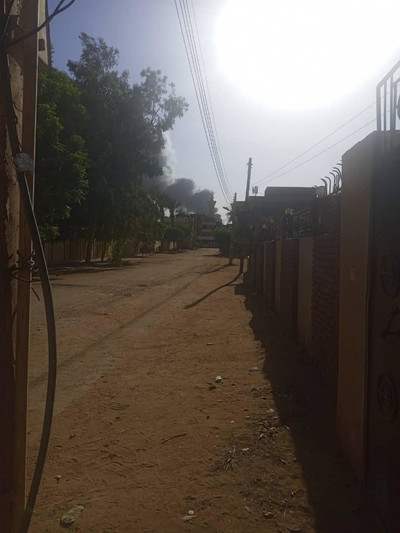
The view from our main door, just before leaving home; in the background, the airport on fire.
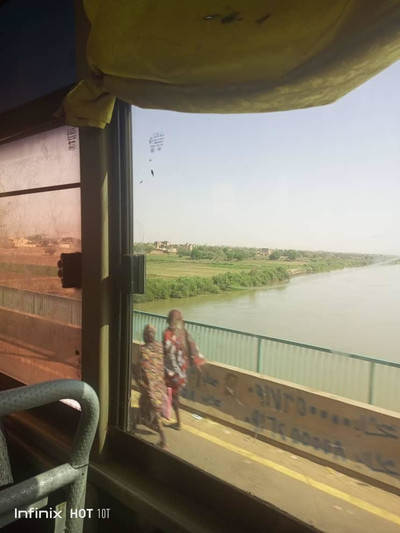
All the way we were seeing people moving out of the city, carrying a small sack each; and others carrying jerrycan containers trying to get water. It was a sad view.
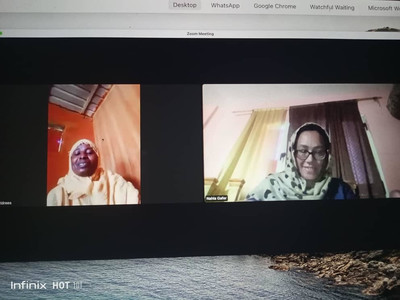
Carrying on the home care through zoom and WhatsApp. Bringing hope to families in their homes, although we ourselves were trapped and insecure.
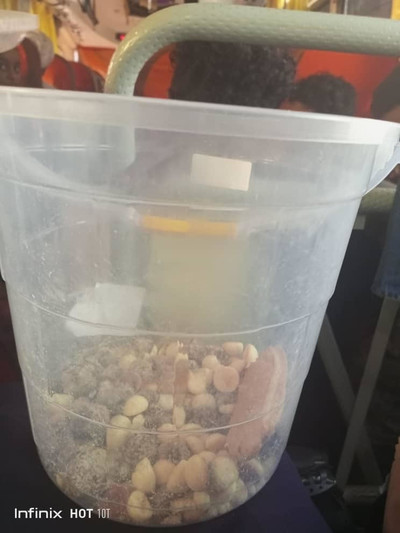
The biscuits for Eid were finished on the bus, offered freely to all passengers by the family.
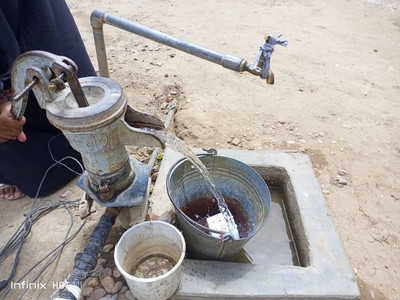
A functioning manual water pump, at the village; reminded me of John Snow and the pump. 1850s.
